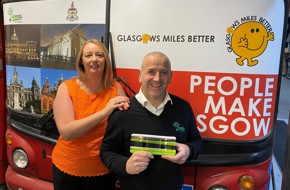Highlights
- Business set up to reduce the environmental impact of electronic waste
- Working across a number of business sectors
- Repair, re-use, remanufacture and recycle, to extend the life of electronic goods
- Saves customers money and provides environmental, social and economic benefits – for example, for one company, Costa Express, their intervention resulted in 3.5 million pounds per year savings
- Reducing partners’ CO2 emissions
- Member of British Association for Supported Employment – supporting individuals who face barriers to employment
- Working with schools, colleges, universities and community groups to educate young people on sustainability and the circular economy, whilst spearheading a project to market or donate repaired tech. such as phones, tablets and laptops, to low-income groups

WEEE Scotland has a growing range of services, finding innovative solutions to the problem of waste electrical and electronic equipment (WEEE). The business works to extend the life of these products through repair, refurbishment, remanufacturing, reuse, recycling and treatment processes.
One example of their work is with Costa Express, who wanted to solve the problem of disposal of machine parts from coffee vending machines. WEEE Scotland developed a scheme to repair or remanufacture component parts, instead of disposing of them. Parts that couldn’t be repaired were recycled in a sustainable way. They also introduced a software system that managed the maintenance of machines and could predict when parts would reach their end of life. These initiatives have resulted in bottom line savings in the region of £3.5m per year, as well as contributing significantly to Costa’s carbon reduction goals.
WEEE Scotland’s innovative approach to finding solutions for WEEE has led to a number of collaborations with other like-minded businesses. These relationships have culminated in the development of new projects, as well as helping them to successfully expand into new market sectors and grow their geographical reach across the UK.
Dealing with a growing volume of small electrical items will be managed with investment in a shredding machine, allowing this difficult and hazardous waste stream to be recycled in a sustainable way.
Modifying their site in Govan, to provide new offices and operational areas, was carried out by reusing partitions and structural assets made redundant by two factory shutdowns, in alignment with the company’s ethos of reuse.
WEEE Scotland is working with partners to divert significant quantities of their waste electrical equipment from landfill. With the developments taking place in the Repair and Remanufacturing arm of the business, and the new ability to recycle small electrical items, they expect to be saving customers around 3,000 tonnes of CO2 per annum by 2024.
As a member of British Association for Supported Employment, WEEE Scotland work with local job centres, to support those who would otherwise face barriers in employment. Currently, 40% of their employees fall within disabled or disadvantaged worker categories. Their commitment to social cause is further supported by their membership application to Social Firms Scotland. They have also opened up eight kickstart positions and already have four employed and working full time, with a further four positions planned.
WEEE Scotland is passionate about education and works with colleges, universities and community groups to deliver seminars on how to reduce our impact on the environment by working towards a circular business model. They also deliver workshops to their customers.
WEEE Scotland is working on a project which will see thousands of electronic items, like laptops, smart phones and iPads which have become redundant for use in schools or offices, being repaired and either sold for an affordable price or donated to low-income families or groups.